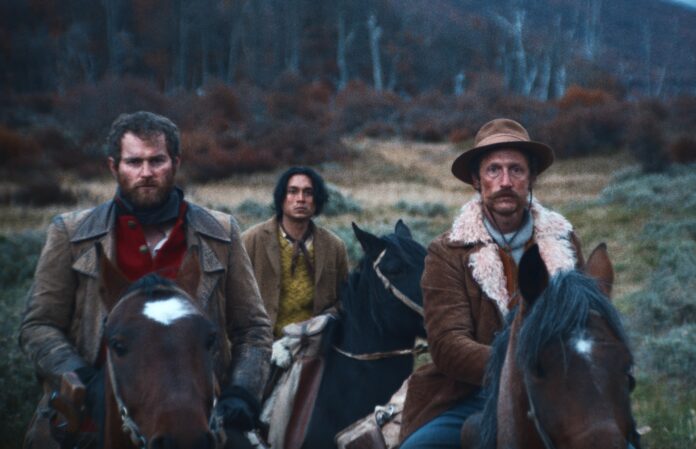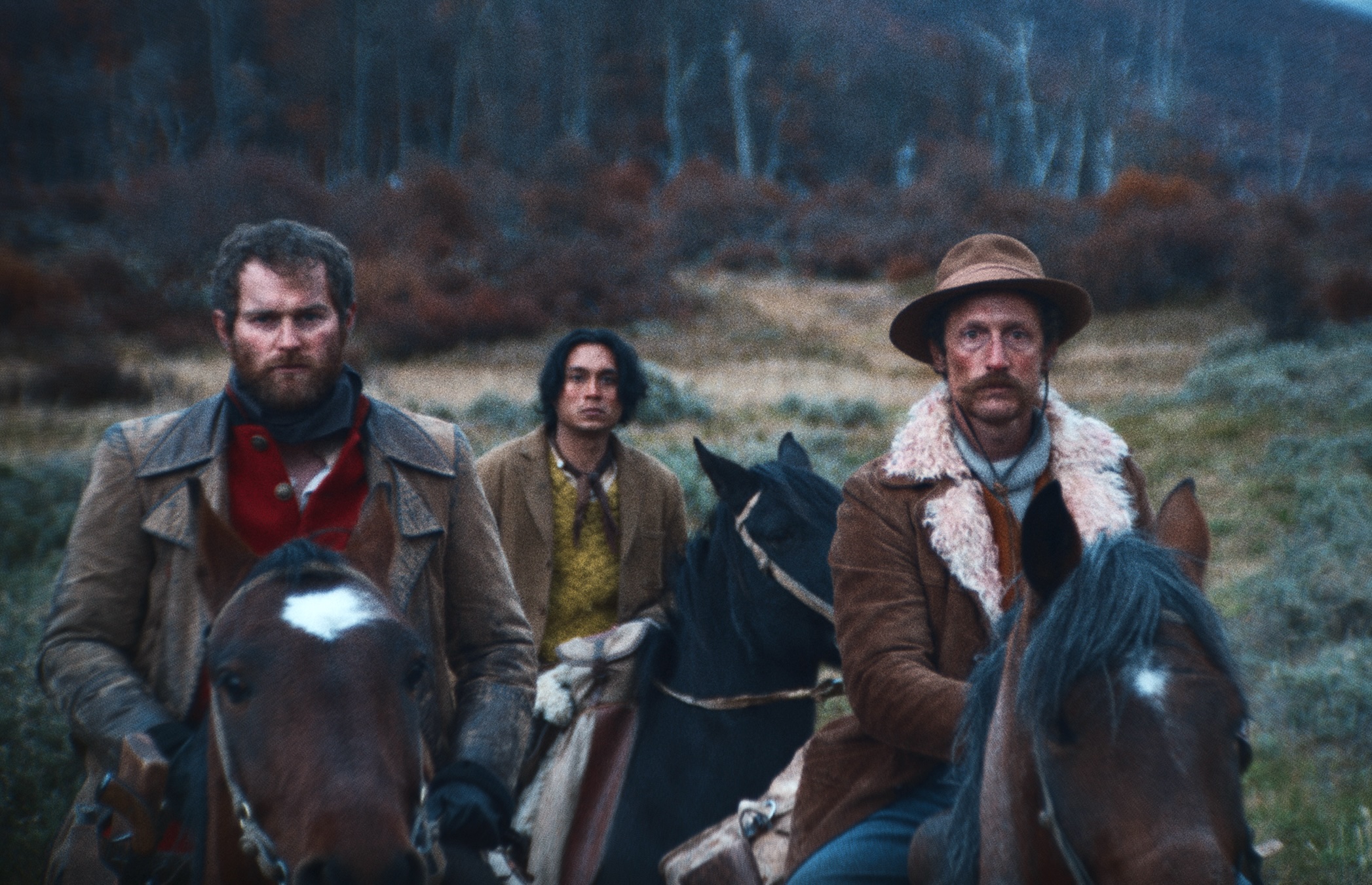In the thick of awards-giving season, one year-end prestige release has been notable for its general absence from contention. Ava DuVernay’s Origin, which expands to theaters nationwide this Friday, is an ambitious, costly, 135-minute endeavor that improbably turns Isabel Wilkerson’s nonfiction bestseller Caste: The Origin Of Our Discontents into a narrative feature. Paul Webb’s script does so by having Aunjanue Ellis-Taylor portray the author herself, as she researches the thesis of her eventual tome—that racial, class, and other biases are just interconnected parts of an oppressive stratification imposed in most societies throughout history—by visiting erstwhile concentration camps in Germany, still-caste-divided India, lynching or institutionalized-violence sites in the US, etc.
Choosing to illustrate what’s essentially an extensively researched, book-length essay in the form of fictionalized drama, it’s a risky conceptual stretch—one that doesn’t really work as such, delivering its fairly obvious points in terms ever more heavy-handedly preachy. No doubt some viewers will find it just as enlightening and inspirational as intended. But alas, I understand why Origin isn’t attracting the awards (or even nominations) hoped for: It’s just not very good, while nonetheless carrying itself with all the solemnity of a two-hour-plus Nobel Peace Prize acceptance speech.
Covering much of the same thematic territory in considerably subtler fashion is Chile’s official submission to the Best International Feature Oscar race. Felipe Galvez’s strikingly assured first feature The Settlers begins in Tierra del Fuego of 1901, though the brutality of forced labor and disposable lives is such that it might just as well be the era of Spanish conquistadores. Their job of exploration and conquest is nearly complete now, however. Albeit not so much that land baron Don Jose Menendez (Alfredo Castro), whose holdings sprawl over national boundaries, doesn’t feel further genocide of pesky “Indians” is in order.
Turning the pampas into a vast paddock for sheep, he is irked that locals keep cutting his fences and stealing livestock. He deputizes Scottish foreman Alexander MacLennan (Mark Stanley), a former English Army soldier, to “find a route to the Atlantic” for his flocks. It is understood that cutting that path should also entail slaughtering any and all natives encountered en route—no matter that they are peaceable and unarmed.
From the workers he oversees, this Lieutenant chooses Segundo (Camilo Arancibia) to accompany him, because the young mestizo (i.e. “half-breed”) is a crack shot. But since Don Jose doesn’t trust non-whites—to put it politely—he forces them to take also take along supposed guide Bill (Benjamin Westfall), a Texan even more racist and bloodthirsty than MacLennan.
Then again, every representative of colonialist interests here seems worse than the last. Crossing the Andes into Argentina, this small company on horseback keeps wreaking havoc on “savages,” yet the only savagery we see is their own behavior. Well, not Segundo’s—horrified by these deeds, he only pretends to participate in them, as far as he can get away with. (It is frequently stressed to him that his life could be extinguished just as easily as their anonymous victims if he does not cooperate.)
The chaptered progress of The Settlers eventually leaps forward to glimpse long-term consequences to these actions. But if the new proprieties of a “civilized” government demand that past atrocities be addressed, we quickly glean that there will be no actual redress—the point is to acknowledge wrongs just enough to comfortably bury them, no longer troubling the conquerors’ briefly awakened consciences.
Galvez’s film (whose original title is Los colonos) recalls prior screen portrayals of Latin American colonial violence, including those of the Cinema Novo movement and classic European co-productions like Herzog’s Aguirre, the Wrath of God and Pontecorvo’s Burn!—as well as Lucrecia Martel’s Zama and other more recent treatments. Like many such, it has both great visual beauty and the frequent quality of a hallucinogenic nightmare, reflecting its characters’ increasing dislocation and madness. Simone D’Arcangelo’s stunning cinematography captures various landscapes in rich, delicate colors. But these vistas aren’t welcoming—they remain aloof, as if rejecting the human abuses practiced on them.
There’s an eerie quietude to the episodic progress that refuses action-movie excitement. While we’re hardly spared the grim facts of murder, rape and more, the worst acts are often presented in near-abstract form. The very good actors are thoroughly committed, yet vivid personalities are always subsumed by a bigger picture that makes them look small. The Settlers does not (particularly towards the end) place much emphasis on narrative drive. Still, its combination of the poetical and cruel leaves a lingering, distinctive impression. For Roxie showtimes, go here.
Two considerably cozier views of humanity are also on tap as of this weekend. The French Driving Madeleine is a two-hander in which grumpy, put-upon middle-aged cab driver Charles (Dany Boon) is tasked with taking the titular 92-year-old fare (Line Renaud) to her new home in an elder-care facility. Though forced by a recent fall, she’s in no hurry to lose her independence by reaching that destination. So to Charles’ initial exasperation, she insists they spend a long day crisscrossing Paris, revisiting the sites of her long life. Meanwhile, she provides him with a running autobiography, her younger self played by Alice Isaaz.
That backstory raises a fair amount of conflict, mostly in the form of a drunken, abusive lout of a husband played by Jeremie Laheurte. But as it’s limited to brief flashbacks in a 90-minute movie, Marguerite’s past never becomes more than a series of melodramatic cliches designed to spur suffering histrionics fit for Joan Crawford or another retro weepie queen. (Nor, for all the emphasis on her rich, full life, does the movie bother with most of it—like documentaries about 1960s or 70s rock superstars, it simply ignores any activities of the last half-century or so.)
Best known at home as a veteran chanteuse, 95-year-old Renaud plays her part with the required twinkle-eyed joie de vivre, while Boon expertly underplays a stock slowly-thawing-grouch figure. Christian Carion’s film provides well-crafted cinematic comfort food, complete with picture-postcard views of Parisian splendors. But I wish its pleasures were a little less predictable, and its sentimentality less pat. Driving opens Fri/18 at area theaters including SF’s Opera Plaza, Marin County’s Rafael Film Center, and the Orinda Theater in the East Bay.
Belated mention should be made of Aki Kaurismaki’s Fallen Leaves, which has already been playing local theaters in recent weeks, but we neglected to cover because… well, let’s just say that the realm of film publicity, like film exhibition, seems to be deteriorating a little more every day. (In other words, we asked over and over when it was opening… then suddenly it already had, and no one told us.) The Finnish writer-director’s first feature in six years is a typically vinegary yet empathetic tale of two lonely hearts who probably belong together, but are each temperamentally inclined to make that happy ending as difficult to arrive at as possible.
Supermarket employee Ansa (Alma Poysti) and metalworker Holsappa (Jussi Vatanen) are closemouthed types well past youth, with no apparent ambitions beyond the low-end jobs they can’t seem to hold onto—she for reasons beyond her control, he because he’s got a bit of a drinking problem. They first spy one another at a karaoke bar where neither has the least intention of singing. After a first date that goes surprisingly well (though it would hardly seem so to any casual observer), they seem destined to be soulmates. But fate has other ideas, throwing multiple roadblocks intheir path.
This isn’t one of Kaurismaki’s absolute best (my personal favorite probably remains the first I ever saw, 1990’s bone-dry The Match Factory Girl), but he’s made worse, and the usual satisfactions of his style—minimalist, deadpan, serving up Finnish miserabilism in a bleak yet funny way—are well served by this small, grudging love story. In addition to still hanging on in some theaters, Fallen Leaves begins streaming on MUBI Sat/19.





